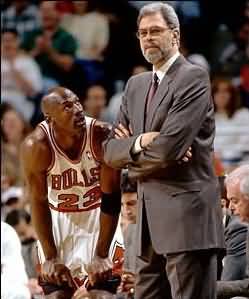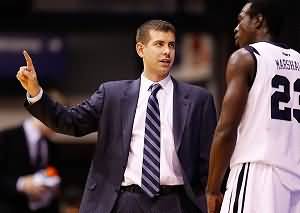Basketball Mental Focus - Stay in the Present
by Anthony B. Lanzillo
From the Coach’s Clipboard Basketball Playbook"Helping coaches coach better..."
Tone Lanzillo is a mental prep coach to athletes who want to be mentally prepared to play their best game. He has worked with student-athletes, from middle school through high school and into college, in such sports as basketball, football, soccer and lacrosse. Over the past several years, he has written for a number of sports blogs and websites, including FirstDown Playbook, Coaches Training Room, Ultimate Hockey Source, and Lax Playbook.
Contact: Anthony B. Lanzillo
Wanted: Dead or Alive
"The mind works most effectively when you're telling it what to do rather than what not to do."
Gary Mack - Mind Gym: An Athlete's Guide To Inner Excellence
"The first step to creating any change is deciding what you do want so that you have something to move toward. The more specific you can be about what you want, the more clarity you will have, and the more power you will command to achieve what you want more rapidly."
Anthony Robbins - Awaken The Giant Within

Many players focus on what they don't want to happen in the game. They don't want to look bad or embarrass themselves. They are concerned about losing the game for their team. And, by only focusing on what they don't want to happen, they are simply creating more stress and anxiety for themselves, and at the same time, will probably end up doing those exact things that they didn't want to happen in the first place.
These players are so worried about themselves that they can't really be in the game, and many of them will begin withdrawing or holding back. They are more concerned about how they look instead of how they can simply play their best and contribute to the team. In essence, they have become "dead weight".
The key is to focus on what you do want. Only focus on what you do want to do in the game and how you want to play. By taking this perspective, you will become more proactive and more open to seeing every situation and experience in that game as a learning opportunity to grow as a player. When you focus on what you want, you become more assertive, more passionate about playing, and basically feel more "alive". This creates more enthusiasm, energy and a sense of empowerment for you and your team.
Avoid The Landmines
"This is what is meant by right action: the capacity to observe what's happening and act appropriately, without being distracted by self-centered thoughts. If we rage and resist, our angry, fearful minds have trouble quieting down sufficiently to allow us to act in the most beneficial way for ourselves and others."
Phil Jackson - Sacred Hoops

Phil Jackson and Michael Jordan
Too often, before or during a game, and especially when that game is not going as planned or your team is losing, you step on the one of the "mental landmines" - complaining, blaming, doubting, resigning or questioning yourself. And once you step on one of these landmines, the mental part of your game has blown up.
You have become mentally wounded and disabled. You have raised the white flag and surrendered. This mental approach to playing does nothing to empower you and will not help elevate your play or performance. It will take your mind out of the game, and will leave you with a sense of helplessness and hopelessness.
If you see yourself getting ready to step on any of these landmines, just turn around and walk the other way. Keep your focus on more positive and productive thoughts or images of what you are currently going or capable of doing. It's about taking ownership of yourself and focusing on what you are going to do at any given moment of the game. Concentrate on what you want to accomplish and achieve to make you a better player. You will be thinking clearer, with more composure and confidence.
Break It Down
"When the game started, Craig was a different guy, locked into an almost trancelike concentration, always trying to be extra focused on the first and last five minutes of the game. The other fifty minutes, he'd break down into similar five-minute chunks. He never let himself think about throwing a sixty-minute shutout, just twelve five-minute ones. It was all a self-constructed mind game, Craig's one-save-at-a-time mantra."
Wayne Coffey - The Boys of Winter: The Untold Story of a Coach, a Dream, and the 1980 U.S. Olympic Hockey Team
"If you look at the summit and say to yourself 'I've got four thousand vertical feet to go over the next 12 hours' that's psychologically overwhelming. You probably won't make it. What I do is break it down into the smallest possible units. That rock forty feet away becomes my first target."
Ed Viesters - No Shortcuts To The Top: Climbing The World's 14 Highest Peaks
"More important than winning was to do everything possible to win on every possession."
David Woods - UNDERDAWGS: How Brad Stevens And Butler University Built The Bulldogs For March Madness

Coach Brad Stevens
Many players enter the game thinking about how they are going to win the game. Their attention and concern is basically spread out over the entire length of the competition. Therefore, at any point during the game, their thoughts are bouncing back and forth between what has happened, what is happening and what will happen.
Not only can they not focus on the present moment, and simply think about the task in front of them, but they put a lot of emotional pressure upon themselves because they are thinking about how they must control the whole game. For many of these players, the pressure is too much and they fall apart.
You can improve your ability to mentally manage a game by simply breaking it down into smaller or shorter segments or time periods. Instead of trying to think about playing and winning the whole game, you can focus on the next five minutes or even the transition from defense to offense. By reducing what you have to look at and think about you raise your level of awareness and concentration on what you do control; and this will contribute to a greater sense of composure and confidence in yourself.
Related page: Mental Prep Playbook